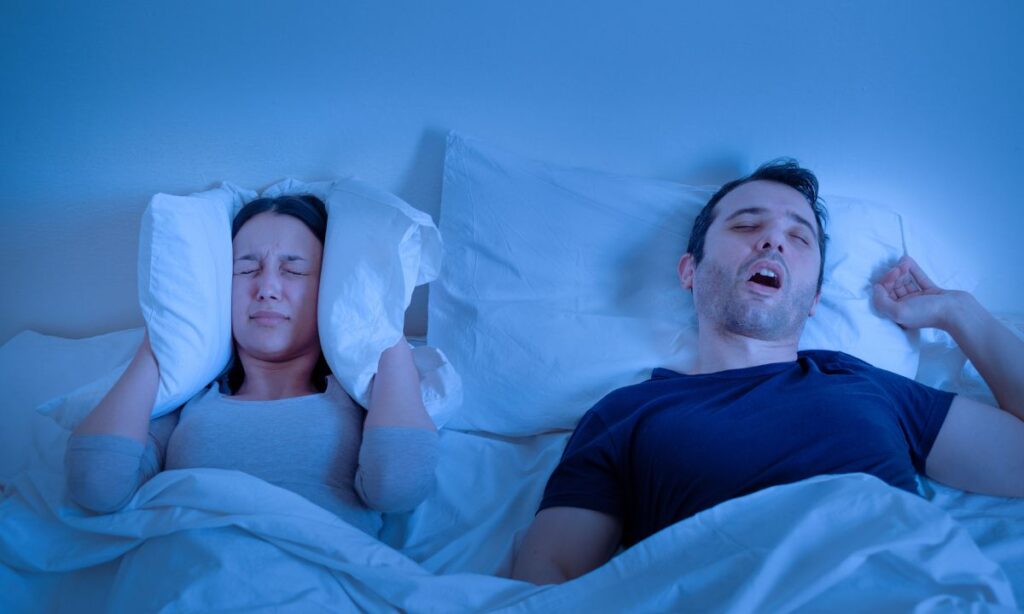
Hypnotherapy helps with sleep apnea
Sleep apnea is a potentially serious sleep disorder in which breathing constantly stops and starts. However, you might have sleep apnea, If you snore loudly and feel tired indeed after a full night’s sleep.
Sleep apnea affects the way you breathe when you ’re sleeping. In untreated sleep apnea breathing is compactly interrupted or becomes really shallow during sleep. These breathing pauses generally last between 10- and 20- seconds and can happen up to hundreds of times a night.
Untreated sleep apnea prevents you from getting a good night’s sleep. When breathing is paused, you ’re jolted out of your natural sleep rhythm. As a consequence, you spend further time in light sleep and lower time in the deep, restorative sleep you need to be energetic, mentally sharp, and productive the coming day.
This habitual sleep deprivation results in day sleepiness, slow revulsions, poor attention, and an increased threat of accidents. Sleep apnea can also lead to serious health problems over time, including diabetes, high blood pressure, heart disorder, stroke, and weight- gain.
Related- HYPNOSIS FOR WEIGHT LOSS
The main types of sleep apnea are
- Obstructive sleep apnea( OSA), which is the more common form that occurs when throat muscles relax and block the flow of air into the lungs
- Central sleep apnea( CSA), which occurs when the brain does not shoot proper signals to the muscles that control breathing
- Treatment- emergent central sleep apnea, also known as complex sleep apnea, which happens when someone has OSA — diagnosed with a sleep study — that converts to CSA when receiving remedy for OSA
Sleep Apnea Symptoms
The symptoms of obstructive and central sleep apneas overlap, occasionally making it delicate to determine which type you have. The most common symptoms of obstructive and central sleep apneas include
- Loud snoring.
- Episodes in which you stop breathing during sleep — which would be reported by another person.
- Heaving for air during sleep.
- Awakening with a dry mouth.
- Morning headache.
- Difficulty staying asleep, known as wakefulness.
- inordinate daytime sleepiness, known as hypersomnia.
- Difficulty paying attention while awake.
- Irritability.
How Can Hypnotherapy Help treat sleep apnea?
With mild cases of sleep apnea, simply changing your life up like working on losing weight, cutting back or quitting smoking, drinking less alcohol, and avoiding sleeping pills can be treatment enough. Avoiding sleeping on your back and trying other sleeping positions can help as well.
A CPAP( continued positive airway pressure) machine is the most common medical treatment, which is a mask over the nose and mouth, connected to a machine delivering a constant inflow of air into your nose. Newer CPAP machines have nose only masks and minor more comfortable ones with numerous to choose from.
As for hypnotherapy, it’s a great tool for numerous who have issues with sleep apnea. It can either help with aiding the CPAP machine for those who struggle to sleep with it, or it may help in devastating sleep apnea altogether, depending on which type of apnea you ’ve been diagnosed with.
Your subconscious mind is strong. It fluently remembers the time you had high- quality, undisturbed sleep patterns; thus, hypnotherapy is the best tool to access this information and bring these recollections up front. Your subconscious can also gather and remove anything that may be preventing you from a good night’s sleep.
Contact Our Professional Hypnotherapist !!

With hypnotherapy you can do so much for your sleep apnea
- Learn better breathing ways to help clear your airways
- Find ways to change your resting position to arouse further comfort
- Use your mind- body connection to enhance the signals from your brain to the muscles you use to breathe
- Learn to clear your mind of casual thoughts when getting ready to sleep
- Learn to release any subconscious feelings and recollections that may have been the precursor to your poor resting habits and sleep apnea
Does your sleep apnea contribute to other sleeping diseases, similar as paralysis? If so, feel free to explore How Hypnotherapy Can Help with Sleep Paralysis, if you or someone you know is floundering with life while this condition is present.
And if you have any farther questions about sleep apnea and how hypnotism can help you, Call us today!!
The Benefits of Hypnotherapy Treatments for Sleep
Sleep hypnosis is a great option for individuals who are looking to approach their health in a holistic manner. Although you might want to concentrate on excluding disordered sleeping, you’ll most probably see advancements in other areas of your overall health. When you start hypnotherapy, you can generally anticipate to see results including
- Increased alertness, energy, and drop in irritability
We ’ve all been there- trudging through our work day after a restless night with only 3- 4 hours of sleep. Small annoyances are magnified and it’s hard to keep from exploding at the slightest obstacle! It presumably comes at no surprise, also, that a full night of sleep is advantageous to our energy levels, productivity and overall positive attitude.
- A sense of well-restedness that extends into physical wellbeing
The benefits of a good night’s sleep don’t end there.
- A lowered risk of getting sick
- Staying at a healthy weight
- A lowered threat of diabetes, heart disorder, and other health conditions
- Avoiding accidents related to a loss of alertness, i.e. auto accidents
- The capability to better handle sleep disorder occurrences
Related Self-Hypnosis Benefits
Over the course of your hypnotism treatment, you may admit materials and other support for dealing with sleep disease episodes on your own. These materials might include- but aren’t limited to- exercises similar as tapping, breathing, and/ or visualization.
Exercises similar as those listed over are a great way to get a sense for some of the basics of Self- Applied Hypnosis approaches for sleep.
Tags:
Post Categories
- All Post (12)
- Services (20)
- Astrology (15)
- Past Life Regression (20)
- Money Reiki (15)
- Mid Brain Activation (08)
